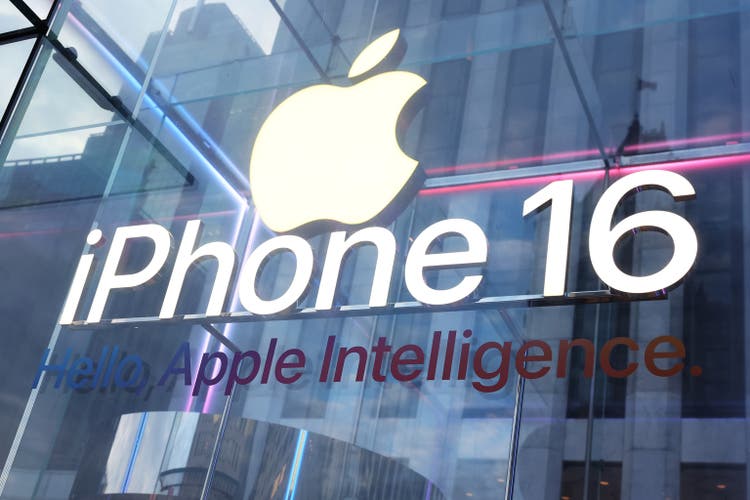
Michael M. Santiago/Getty Images News
The latest versions of Apple’s (NASDAQ:AAPL) iPhones, Watches and AirPods officially went on sale on Friday. And while there is debate over how well (or not so well) the iPhone 16 line is resonating with early consumers, investors have several lingering questions about the future of the tech giant.
Upgrade timing
Perhaps the biggest question investors have is when the next iPhone replacement cycle will start, Needham analyst Laura Martin said.
Martin, who has an Overweight rating and $260 price target on Apple, believes it could come from the new iPhone 16 line. Or perhaps either of the next two versions of the iPhone. It’s just too early to know.
Apple trades at 30 times estimated 2025 earnings, while the average multiple for the S&P 500 is around 20. “By implication, AAPL is trading at a 50% premium to the S&P500,” Martin wrote. “Which year consumers replace their iPhones determines whether AAPL’s share price is too cheap or too expensive today, we believe.”
Generative AI
Investors also have concerns about Apple’s generative artificial intelligence prospects.
While the company showed off Apple Intelligence at its developer conference in June, it is rolling out the features in a measured way. As such, investors have wondered whether Apple is falling behind the competition, including Google (GOOG) (GOOGL), Meta (META), Microsoft (MSFT) and Amazon (AMZN), Martin said.
“Investors worry that GOOGL will be a more formidable competitor to AAPL in a Gen AI-centric world,” Martin said.
Apple’s ability to maintain market share if it doesn’t have cutting edge generative AI and whether iPhone users stay in the Apple ecosystem if its features lag that of others are key for investors, Martin added.
China
China is the most important market for Apple, next to the U.S. However, iPhone sales in China have fallen as a percentage of total revenue in recent years, to roughly 18% in its most recent quarter.
Rising geopolitical concerns, as well as competition from Huawei and others, are at the forefront of the issue, Martin said.
iPhone dependence
The next issue is how reliant the Tim Cook-led company has become on the iPhone for revenue.
In recent memory, the iPhone has been around 50% of total revenue, including 45.8% for the most recent quarter and 50.6% for the prior quarter.
And while the iPhone is the “anchor” device (with everything else being considered an add-on), there are concerns Apple is “essentially a single product company,” Martin said.
Vision Pro
Apple introduced the $3,500 Vision Pro in June 2023, which it described as a “revolutionary new product.”
It went on sale in early February and since then, there has been little from the company about how well it has sold. Martin said investors are confused by it: 40% think it was created as a direct response to Meta’s Quest; 40% think it’s a waste of time and money; and the remaining 20% said it will “work,” (though the definition of work is wide-ranging).
“Few investors we speak with believe that the Vision Pro will be a key revenue driver within the next 5 years, and therefore it is merely a distraction from more important competitive issues,” Martin said.
Questions range from how the Vision Pro fits into Apple’s strategy to whether Apple is ignoring the generative AI software revolution.
Services
Apple’s valuation has largely become dependent on its service-related revenue, which have routinely grown at double digits every quarter.
And while Apple Music, iCloud, the App Store, advertising and more have helped, questions remain about whether they can continue or if there is another service that can maintain its overall growth rate, Martin said.
Health
Apple has pushed further and further into health, most recently with sleep apnea features for the Apple Watch Series 10 and hearing aid capabilities for the new AirPods. But as Apple pushes further into health, investors worry it may invite more regulatory scrutiny, Martin said.
“Today, it is unclear how AAPL will monetize health products, but most investors agree that the heavily-regulated health sector attracts incremental legal costs and government scrutiny, which add risks to AAPL shares,” Martin wrote.
Global regulatory risks
The recurring theme around the world from regulators has become “big is bad,” Martin said.
“The key debate is how effective regulators and legislators will be, and what is AAPL’s recourse if a government forces it to ‘open’ its ecosystem in order to give consumers more choices,” she wrote.
The recent request by the European Union to get Apple to open up its operating system is unlikely to have much of an impact in the short-term, Seeking Alpha analysts said.
Apple’s competitive position
Lastly, many investors believe Apple’s annual product introduction cycle has become “too slow” as technology accelerates, Martin said. There’s also the belief that Apple ignores the competition, while investors do not.
